

ACTA : comprendre la procédure d'adoption en une image. (pour voir l'infographie en taille réelle, cliquez sur l'image)
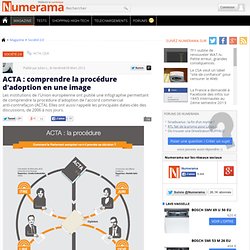
What you should know about ACTA. What is ACTA about?
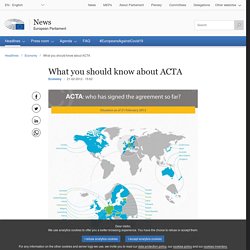
The Anti-Counterfeiting Trade Agreement (ACTA) is aimed at more effectively enforcing intellectual property rights on an international level. Many countries are worried that their economies suffer great damage due to counterfeiting and piracy. OECD estimated in 2005 that international trade in counterfeit and pirated products amounted to $200 billion, excluding digital products.
Digital Agenda / EU court cool on copyright enforcement by private companies. In an opinion with significant implications for ongoing EU discussions on how to deal with online copyright infringement and internet piracy, an EU advocate general on Thursday said a Belgian internet provider cannot be forced by a national court to block users from illegally sharing music. The ruling could have a wide-reaching impact on efforts to get private companies to police the internet (Photo: Bombardier) Pedro Cruz Villalon of the European Court of Justice argued that ordering an Internet Service Provider (ISP) to filter and block electronic communications in a bid to protect copyright in principle "infringes fundamental rights". He also said that if an ISP installs a filtering system, this would breach the EU's Charter of Fundamental Rights on data protection and privacy of communication grounds. A policy tool it has increasingly considered in recent times is recruiting internet providers to help clamp down on illegal online activity.
Similar questions have been elsewhere. Media representative urges European Parliament to reassess ACTA to safeguard freedom of expression.
Tradoc_148964. ACTA - actual agreement. IIPA Report 301SPAIN. Anti-Counterfeiting Trade Agreement. The Anti-Counterfeiting Trade Agreement (ACTA), is a multinational treaty for the purpose of establishing international standards for intellectual property rights enforcement.
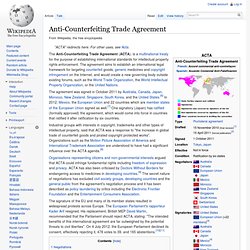
The agreement aims to establish an international legal framework for targeting counterfeit goods, generic medicines and copyright infringement on the Internet, and would create a new governing body outside existing forums, such as the World Trade Organization, the World Intellectual Property Organization, or the United Nations. The agreement was signed in October 2011 by Australia, Canada, Japan, Morocco, New Zealand, Singapore, South Korea, and the United States.[6] In 2012, Mexico, the European Union and 22 countries which are member states of the European Union signed as well.[7] One signatory (Japan) has ratified (formally approved) the agreement, which would come into force in countries that ratified it after ratification by six countries. Negotiations[edit] Leaks, publications and consultations[edit] EU parliament chief joins anti-Acta camp. BRUSSELS - European Parliament chief Martin Schulz has spoken out against a new intellectual property regime, amid growing signs it will face problems getting past MEPs.

Schulz (l) took up his new post last month (Photo: europarl.europa.eu) Speaking on a German TV show - the ARD channel's Report from Berlin - on Sunday (12 February) Schulz said: "The necessary balance between the two - protection of copyright on the one hand and fundamental rights of [Internet] users on the other – is very poorly enshrined in this treaty. " He added: "I do not think that with the current draft treaty ... progress has been made. " The so-called Acta agreement is to create a new global body outside the UN or the World Trade Organisation to govern the sale of generic medicines and to stamp out counterfeit products and illegal file-sharing on the Internet. Twenty two EU countries as well as Australia, Canada, Japan, Morocco, New Zealand, Singapore, South Korea and the US have signed up.
Bruselas pide que los 27 abran sus datos en internet. Si no es por la calidad de la democracia, al menos que sea por dinero.
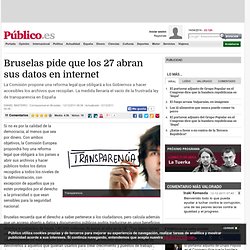
Con ambos objetivos, la Comisión Europea propondrá hoy una reforma legal que obligará a los países a abrir sus archivos y hacer públicos todos los datos recogidos a todos los niveles de la Administración, con excepción de aquellos que ya estén protegidos por el derecho a la privacidad o que sean sensibles para la seguridad nacional. Bruselas recuerda que el derecho a saber pertenece a los ciudadanos, pero calcula además que un acceso abierto a datos y documentos públicos podría traducirse en unos beneficios directos e indirectos de hasta 140.000 millones de euros al año en la UE. Counter-Arguments Against ACTA. Below are arguments that can help you debunk the EU Commission's lies on ACTA, which are also relayed by pro-ACTA members of the EU Parliament.
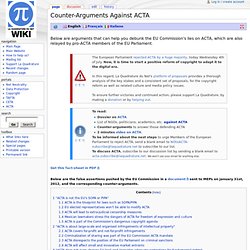
Get this fact-sheet in PDF Below are the false assertions pushed by the EU Commission in a document sent to MEPs on January 31st, 2012, and the corresponding counter-arguments. [edit] "ACTA is not the EU's SOPA or PIPA" In some important ways, ACTA is worse than SOPA. Acta-bklt-p2s. Stop ACTA! By EDRi On 4 July, the European Parliament has rejected ACTA with an overwhelming majority (478 against, 39 in favour, 165 abstentions).
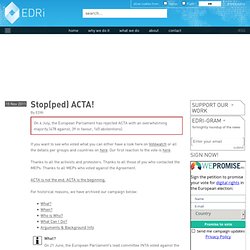
If you want to see who voted what you can either have a look here on Votewatch or all the details per groups and countries on here. Our first reaction to the vote is here. Thanks to all the activists and protesters. Thanks to all those of you who contacted the MEPs. ACTA is not the end. For historical reasons, we have archived our campaign below: EP Rapporteur for ACTA: 'Masquerade' Behind ACTA. Embajadora de Eslovenia que firmó ACTA se disculpa públicamente por haberlo hecho.
Esta explicación declara que yo firme el acuerdo porque el gobierno me dio instrucciones de hacerlo, porque es parte de mi trabajo.
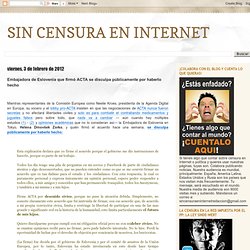
Todos los día tengo una pila de preguntas en mi correo y Facebook de parte de ciudadanos atentos y algo desconcertados, que no pueden entender como es que se me ocurrió firmar un acuerdo que es tan dañino para el estado y los ciudadanos. Con esta respuesta, la cual es puramente personal y expresa únicamente mi opinión personal, espero poder responder a todos ellos, a mis amigos y conocidos que han permanecido tranquilos, todos los Anonymous, y también a mi misma y a mis hijos. ACTA Protests Worldwide - Brought to you by stoppacta-protest.info.
We Have Every Right to Be Furious About ACTA. If there’s one thing that encapsulates what’s wrong with the way government functions today, ACTA is it.
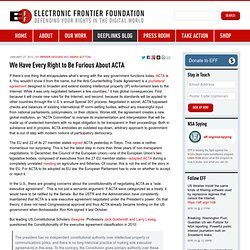
You wouldn’t know it from the name, but the Anti-Counterfeiting Trade Agreement is a plurilateral agreement designed to broaden and extend existing intellectual property (IP) enforcement laws to the Internet. While it was only negotiated between a few countries, it has global consequences. First because it will create new rules for the Internet, and second, because its standards will be applied to other countries through the U.S.’s annual Special 301 process. Negotiated in secret, ACTA bypassed checks and balances of existing international IP norm-setting bodies, without any meaningful input from national parliaments, policymakers, or their citizens. The EU and 22 of its 27 member states signed ACTA yesterday in Tokyo. In the U.S., there are growing concerns about the constitutionality of negotiating ACTA as a “sole executive agreement”. (And by the way, we agree [pdf].)